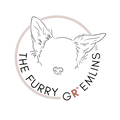Meet my "reactive" rescue pup
Haggie used to be dog social when he was younger. He was - in my eyes - perfect. He wasn’t over obsessive with other dogs but was happy to say a quick hi and bye to off lead dogs that came to us & play nicely with his close friends that he’d see regularly on our walks. 🐕
When things started to change
When he was about one, things started to change. Some slowly some all of a sudden. Some days he was overly boisterous to dogs that he had known since a while and on others he would be scared of dogs that came too close.
I wasn’t great at reading dog body language back then but still saw that something needed to change. A little too late for my own liking but I stopped taking him to the same places as walks just didn’t seem enjoyable for both of us anymore.
I avoided most dogs but he became fearful of just being outside. Strangers became his biggest fear but I’ll touch on that another time.
We seeked help from vets, trainers and behaviourists but it took us a while to find the right people that would understand us and help us moving forward.
We had trainers who suggested aversive tools and time outs, stop interacting with Haggie when he seeks us out for cuddles to reduce his anxiety. And I am glad I never listened to their advice.
About aversive tools in dog training and why I did not go down that route
Could I have started making Haggie looked well behaved around other dogs by using corrections and intimidation? Yes. But that would have not changed how he feels about the world and other dogs. This wasn’t a quick fix (and I’d still call him dog reactive because he is in certain situations and on certain days), it took years of work and figuring out the reason behind the reactivity. Long story short, pain was the main factor, his breed genetics and his upbringing. With the help of medication 💊 and changing his perception of other dogs by masking him feel safe and in control he has become a dog that enjoys being around other dogs again. He made many friendships over the years and is happy to trot along with dogs he doesn’t know as long as they don’t get into his little bubble.
Aversive tools might stop the behaviour you don’t like (lunging, barking) but they will make your dog feel crap. They most likely will even make the fear of the trigger so much worse. You dog will still show signs of discomfort but they will be more silent, easy for us humans to ignore. Will your dog learn to like other dogs again this way? No. And that can’t really be what we want.
It takes a village of the right people to support you and I am thankful for everyone that was and still is part of our journey.
Looking to advocate for your reactive dog?
Find our reactive dog collection here.
Or browse all of our apparel here




